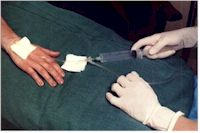|
|
||||||||||||||||||||||||||
|
Surviving cancer |
|
|||||||||||||||||||||||||
| Home | Cancer treatments | Lifestyle and cancer | Site map | Contact us |
|
|||||||||||||||||||||||||
| Contents and Links: Benefits of lifestyle | "What to do" | "What not do do" | When to consider a lifestyle change | Giving up smoking | Diet | Exercise | The Lifestyle After Cancer guide book | Genetic testing | Travelling and cancer | Making a will | Coping strategies for symptoms | Long term bone health | ||||||||||||||||||||||||||
This section offers practical lifestyle guidance to reduce the risks of cancer and improve well-being. The background evidence is based on well conducted international research which leaves no doubt that what we choose to do and don't do to our bodies can influence well-being and outcome after cancer. The factors which influence the risk of developing cancer and those which influence its relapse are similar. These have been summarised in the sections "What to do more of" and "what to do less of" below. The lifestyle strategies which can reduce risks and help you cope with side effects are listed in the individual headings below. They have been split into strategies to help with risks and side effects during cancer treatments and those which help speed up recovery and help the long term risks and side effects.
Information on other lifestyle issues:   When to consider a lifestyle initiative.
Shortly after their diagnosis, patients and their relatives are confronted by a sudden commotion activity
usually traveling to the hospital for blood tests, x-rays, scan, biopsies, and
treatments. This causes enormous upheaval to the daily routine
both socially and at the work place. Most
of your time is taken up adjusting to their new diagnosis, with coping with the
side effects of therapy and the difficulties of remembering, where and when they
have to be and what to do when they get there! Forcing yourself into a strategy which you
cannot do for practical or physical reasons
would be inappropriate or at worse may project a feeling of guilt which is
counter productive. Depending on the individual circumstances, at an early point in the treatment pathway,
however, the subject could be introduced gradually and sensitively. The timing
is paramount, as is ability of the clinician to assess the patientís
receptiveness to considering lifestyle issues at each stage. Too early and the
anxieties of the circumstances will be confounded, too late and the benefits of
lifestyle will be overlooked. When to consider a lifestyle initiative.
Shortly after their diagnosis, patients and their relatives are confronted by a sudden commotion activity
usually traveling to the hospital for blood tests, x-rays, scan, biopsies, and
treatments. This causes enormous upheaval to the daily routine
both socially and at the work place. Most
of your time is taken up adjusting to their new diagnosis, with coping with the
side effects of therapy and the difficulties of remembering, where and when they
have to be and what to do when they get there! Forcing yourself into a strategy which you
cannot do for practical or physical reasons
would be inappropriate or at worse may project a feeling of guilt which is
counter productive. Depending on the individual circumstances, at an early point in the treatment pathway,
however, the subject could be introduced gradually and sensitively. The timing
is paramount, as is ability of the clinician to assess the patientís
receptiveness to considering lifestyle issues at each stage. Too early and the
anxieties of the circumstances will be confounded, too late and the benefits of
lifestyle will be overlooked.
|
||||||||||||||||||||||||||



 Fortunately,
between a combination of early detection and better treatments there are more
and more people are surviving cancer. Although many are completely well, living
full and active lives many also have to deal with the physical scars of the
disease and side effects of treatment. Most survivors have to cope with the
psychological trauma and the worry of the cancer returning.
Fortunately,
between a combination of early detection and better treatments there are more
and more people are surviving cancer. Although many are completely well, living
full and active lives many also have to deal with the physical scars of the
disease and side effects of treatment. Most survivors have to cope with the
psychological trauma and the worry of the cancer returning. 



